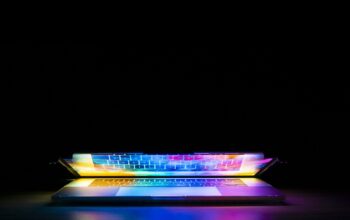Imagine finishing a video call, your laptop screen dims, and a calming voice asks: “Need to reset? Let’s breathe together.” This isn’t sci-fi—it’s the reality of mental health-conscious laptops reshaping our relationship with technology.
The Rise of the Mindful Machine Gen Z’s 300% spike in mental health app usage has tech giants rethinking laptops. While dedicated “mental health laptops” don’t yet exist, cutting-edge devices now integrate tools becoming essential for emotional resilience:
1. Galaxy Book4 Edge – Your AI Copilot Against Burnout Samsung’s latest includes “Galaxy to PC” AI sync, letting your phone’s wellness tools (like Samsung Health’s stress scores) appear on your laptop. Real-world impact: Remote workers use the S Pen’s haptic feedback during video meetings to discreetly ground themselves through tactile stimulation—proven to reduce anxiety.
2. Chromebook Plus – The Zen Master Google’s Wellbeing Dashboard now predicts when you’ll hit peak stress based on calendar density, suggesting “Focus Time” blocks. Teachers use this during grading marathons—one shared how it automatically mutes notifications when her heart rate rises (via paired wearables).
3. AI-Powered Journaling Assistants Laptops with GPU-accelerated AI (like NVIDIA Studio models) run apps like Aura that analyze typing patterns. Example: A freelance designer’s laptop flagged increased late-night error frequency, prompting an automated wellness check-in.
4. The Blue Light Warriors ASUS ZenBook’s Eye Care tech goes beyond filters. Its temporal luminance adjustment (fancy term for smarter dimming) helped a night-shift nurse maintain circadian rhythms. Paired with Noise Reduction AI, it creates what one user calls “a sensory safehouse”.
5. The Therapeutic Multitasker Microsoft Surface’s Adaptive Accessories now integrate with mental health platforms. A college student combined its adaptive mouse with the Headspace app: “When my hand tremors flare, the cursor’s motion smoothing helps me meditate without frustration.”
Why This Matters Now
- Remote Work Realities: 63% of hybrid workers report tech-life balance struggles (source: APA)
- Gen Z Demand: Digital natives expect devices that reflect their mental health priorities
- AI Evolution: GPT-4-level models enable proactive (vs reactive) wellness features
What’s Next? Leaked patents hint at biometric keyboards measuring stress via fingertip perspiration and breathing analysis through webcam IR sensors. As one UX designer told me: “Soon, your laptop will know you need a break before you do.”
References:
- https://www.samsung.com/us/galaxybooks/
- https://explodingtopics.com/blog/gen-z-trends
- https://therapyhelpers.com/blog/online-therapy-italy/
- https://www.globenewswire.com/news-release/2025/04/26/3068732/0/en/These-5-AI-trends-Will-Shape-2025-Says-New-Report.html
- https://www.audiologyonline.com/articles/research-quicktakes-volume-9-clinical-29289
- https://www.joyce.edu/wp-content/uploads/2025/04/Catalog-2024-2025_04.25.2025.pdf
- https://www.lighthouseglobal.com/insights
- https://vyncs.com/blogs.aspx



